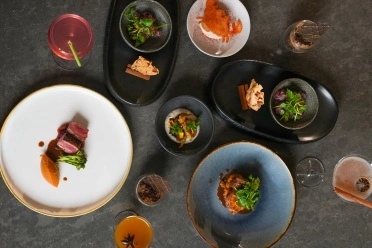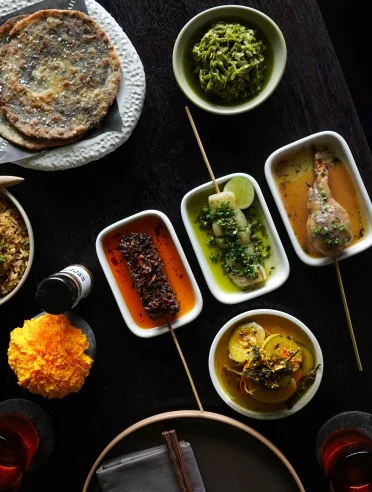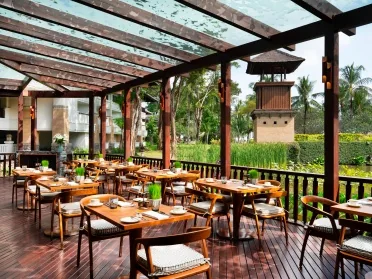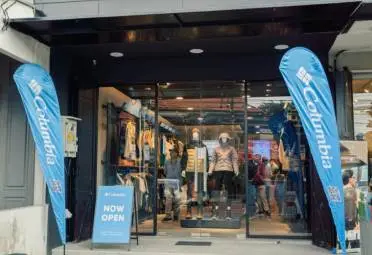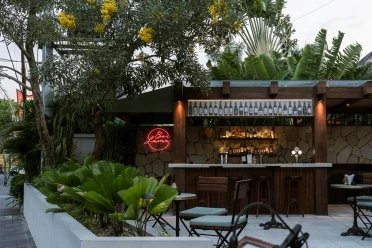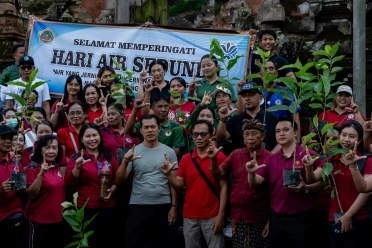Committed to prioritizing in sourcing ethical and sustainable red meat products, PT Global Pratama Wijaya is proudly presented to showcase the world class Australian Grassfed Beef - Bass Strait as an exclusive importer in Indonesia that has a sense of care and deep respect for the products that they are entrusted so Indonesian customers get to enjoy the hard work from the paddock on their plates.
Bass Strait is a masterpiece from six-generation farmers who show true passion in creating sustainable farming through 100% grassfed beef with no antibiotics ever and no added hormones. The quality has been trusted and vouched for by many top-hatted international chefs around the world.
The grand launching event was successfully held at The St. Regis Bali Resort Nusa Dua on October 25, 2022. Partnered with Lotus Food Services as the exclusive distributor in Bali, the event was followed by a sumptuous set-course dinner featuring the use of various specialty cuts from Bass Strait. During the event, we got an exclusive sit-down interview with Queenie Wang, Export Sales Manager for SE Asia at Greenham representing the Bass Strait. In this interview, she explains the prominent factors of Strait Bass beef and how the product got a lot of potential in Indonesia.
Firstly, welcome to Bali! How has the island been treating you?
I've been to Bali quite a few times now. I spent quite a bit of a personal holiday in Bali. So I am very glad to be back for business for the first time in Bali. It's an absolute pleasure to be here and it's just very beautiful, especially around the time of G20, so everything is refurbished and everything is very pretty. So yeah, very lucky. I'm very much enjoying it at the moment.
Could you kindly share with us your name and what is your title, and what is your responsibility in your company?
My name is Queenie, Queenie Wang. I am the Export Sales Manager for Southeast Asia market at Greenham so it's pretty self-explanatory that my job is to look after the sales part of the job into markets like Indonesia, Thailand and Singapore etc. Indonesia is one of my main markets I want to really grow this year. It's got a lot of potential a lot of population. So yeah, I see a lot of opportunity in the market. So I look forward to it.
Can you describe to us about Bass Strait to our readers?
Bass Strait beef is a premium grassfed beef, which is quite new and quite unique to the Indonesia market. You know, there's a lot of grainfed and Wagyu beef in the market at the moment. I just spoke to some chefs during the event, it's been a trend, and the grainfed beef with the high marbling has been a trend for the past 15 years. Bass Strait is quite different. The emphasis is not on the marbling. It's more on the mineral and clean taste and the health benefits of the product. It is very unique to the market. And it's going to be exciting to introduce a new, I guess, portfolio of flavor into the market. But there's also a lot of opportunity to be outstanding in the market as well.
Where is the Bass Strait from? What is the farm like?
Right, so we have a lot of producers all across the southern part of Australia. We have roughly 4,000 to 5,000 producers for Bass Strait beef particularly. They are located across the southern part which is Victoria, Tasmania, Victoria being Gippsland mainly and South Australia and the Southern part of New South Wales. So that's where we source our Bass Strait cattle from. And to describe the farm is just to picture a very big property with abundance of green grass and the cattle just grazing on the paddock roaming around doing whatever cattle would do and just enjoying the life. There's no confinement, there's no feedlot, everything is natural. And the animals are being handled with, you know, the highest level of humane practices and the farmers care about the cattle. And they try to improve their soil and pasture quality to make sure that they provide the highest quality of grass feed possible.
Tell us more highlights about the Bass Strait products?
The first thing I think is the uniqueness and the newness of the product into the Indonesian market, it will be a very exciting product. And for customers who are very used to a high marbling fatty meat, it will be very refreshing. It will taste very fresh and one of the chefs in the event just now mentioned that it doesn't make you feel bloated after you have some and you can have you know more of it without feeling you know, all stopped up or a bit greased up. So that's definitely you know, it's a great alternative and it's a great option for day to day steak. Whereas you know, your wagyu or grainfed is more of a treat more of a luxury item which is reflected on the price point so you know, we're providing a more sustainable option. The price point is obviously friendlier to the day to day consumer.
I’ve been interested about the Greenham Never Ever program, how about that?
So the Never Ever Program was first launched in 2013, it was driven by mostly our customer from the US where it's a very mature market, there's a lot of a lot of consumers that are chasing the all-natural grassfed beef, but at the same time, they want to really, they want a stringent program that can back up all the claims. You know, it's easy enough for a packer to go change the label saying this is 100% grassfed no antibiotic, but there's nothing to back it up. So we decided to build this Never Ever Program to make sure all the standards are being held. And we want to take us out of the equation. So that's why the program is a third party audited program. So we're not involved in checking the standard we have the third party from the industry going on to each into individual farms, once every two years to look at the farmer to look at to sample the soil to making sure that farmers are doing the right thing on farm, making sure they're doing the best they can to provide the highest quality grassfed beef.
How can you easily tell if the meat products taste great and have quality flavor?
I will personally trust the MSA program, the grading system. The MSA system stands for Meat Standards Australia and the MLA which is the organization that established the program, spends a lot of time and resources surveying consumers giving the samples of meat and just narrowing down what factors actually play into the overall liking of the beef. You know your juiciness, tenderness and flavorsome are the top three big factors of a good piece of meat. And from out of all the research MLA over the years, MLA realized that many things that consumers think is a big factor to the overall liking of the steak is actually not quite. What was the key factor actually contributing to the quality of the meat? So I would trust the MSA grading. If a brand is MSA graded, obviously the MSA grading system index on the label, you could trust the product to be consistently eating the same level you first time received, which is now quite often backed up by a lot of grassfed producers. Yes, and I’m happy that Bass Strait is also certified by MSA grading.
What is your process for keeping the meat products fresh during transport?
All our products at the moment are getting delivered and sent out of Melbourne. The product goes to the airport and goes to Jakarta through air freight. We are with Global Pratama Wijaya looking at potentially doing sea container sea freight as well. So obviously from our coast to the airport and from the aircraft to down to the destination, everything is getting stored at an Australian standard, with dry ice being put onto the pallet to make sure the products are chilled properly, especially with chilled products. We had a bit of a challenge with local customers. Once it gets to Indonesia, the humidity, the temperature, there’s a lot of trial and error, but we eventually go into a rhythm, the speed that we deliver and the custom clearance when it comes to documentation. We need everything to be very precise to make sure that there's no delays in the logistic chain, which I think working with global team we have managed to find a good rhythm and speed to make sure the products are delivered to our customer with the minimum amount of handling and delays
Can you give us any insider tips in selecting meats?
I'm a raving fan of the MSA grading system. If I know what product is MSA graded, it would automatically give me the reassurance that this piece of meat is going to be consistent. Yeah. And I wouldn't look at, you know, the different attributes depending on what the consumer is looking at. With the grassfed, you know, I will look at the marbling seeing how fine that marble is, because that's associated with the grass that marble it's a lot finer than grainfed. Also the fat color and overall just meat color. There's a lot of attributes that goes into MSA grading. So essentially just whatever MSA grading that they are looking at grading the product down at the origin, that I think all the factors play a very important role in just selecting the best quality of the beef.
Can you share with us the latest update from Bass Strait, what should we expect in the future?
Right, so we do have some very exciting news. Obviously we have three processing plants right now, two in Victoria and one in Tasmania. We also have Gippsland which is what pasture is coming from at the moment, the other plant in Tongala, which is in the north part of Victoria is going through major renovation at the moment. So we're expecting to open the door to the new plant early next year which means we will be able to increase our supply and carry the Bass Strait name to another new plant. So, there will be more cattle available for the Indonesian market which is very exciting for us.
Where do you see Bass Strait in Bali?
For the Bali market we already have an exclusive distributor in Bali which is Lotus Food Services, and for end-users we also have the product in Grand Lucky Bali.
What do you want to achieve next with PT Global Pratama Wijaya as an exclusive importer in Indonesia?
Well, this year, we are excited to build the market introducing grassfed premium, the idea of premium grassfed beef to the market. So that's our main objective, working hand in hand doing more events like this, inviting our close distributor and chefs to all come together to taste the beef. And it's about growing and developing the market for us this year. So it's very exciting. And you know, there's going to be a lot of opportunities.
How do you see Bass Strait beef in Indonesia?
I see Bass Strait in Indonesia as a staple day to day steak. You know, when you just got off work and you want a piece of steak, but you don't want to feel greasy in your mouth. You want to feel good about yourself. You want that protein, but at the same time you want your house conscious, you go to the Grand Lucky when you go to your local supermarket, you pick up the Bass Strait beef, and that you know that's going to make you feel good. And as you can have that for dinner, tomorrow night, anytime. Yeah. So that's why I see Bass Strait more on the budget friendly side and it's more natural. We’re bringing the best Southern Australian beef to Indonesia.
Any message you want to share with our readers?
Well, I always say try different things, the Bass Strait in Indonesia will be something that is very unique, very different from a different part of Australia. You know, you don't have to be a raving fan of the product, but give it a go.
PT Global Pratama Wijaya
IG : @globalpratamawijaya
IG : @bassstraitbeef



 Juliana Siahaan
Juliana Siahaan
 Nov 02, 2022
Nov 02, 2022
